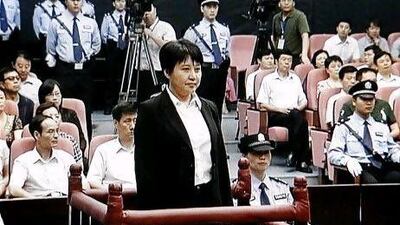BEIJING //Gu Kailai, the wife of the former high-flying Communist Party official Bo Xilai, has admitted responsibility for killing British businessman Neil Heywood last November, the state news agency Xinhua reported yesterday.
"During those days last November, I suffered a mental breakdown after learning that my son was in jeopardy. The tragedy which was created by me was not only extended to Neil, but also to several families," Xinhua quoted her as telling the court on Thursday.
"I solemnly tell the court that in order to maintain the dignity of the law, I will accept and calmly face any sentence and I also expect a fair and just court decision."
The murder saga surrounding Ms Gu took another twist earlier yesterday when four police officers went on trial accused of trying to cover up her alleged crime.
The quartet appeared at a court in Hefei in eastern China a day after Ms Gu was in the dock accused, alongside a family aide, of poisoning Neil Heywood, a British businessman. On Thursday, state media reported Gu and her accomplice "did not raise objections" to the charge of intentional homicide, although no date has been set for the announcement of the verdict and sentencing.
The scandal has already brought down Mr Bo, the former party secretary of Chongqing municipality who was seen as a likely contender for promotion in a leadership transition to begin this year.
Ms Gu, 53, is said to have poisoned Heywood, 41, a long-standing business associate, with the help of Zhang Xiaojun, 33, because the Briton was making threats against Bo Guagua, her son with Mr Bo.
Among the defendants in yesterday's trial was Wang Pengfei, who is thought to have been a close associate of Wang Lijun, the former Chongqing police chief who fled to the US Embassy in Chengdu and revealed details of Heywood's death. Along with his fellow defendants Wang Zhi, Li Yang and Guo Weiguo, he is accused of "bending the law to show favouritism". While foreign journalists have not been allowed in the court in Hefei, further details emerged yesterday about Ms Gu and Mr Zhang's one-day trial on Thursday.
According to a Washington Post report based on information from a person who attended Thursday's trial, evidence presented to the court claimed Heywood had written threatening emails to Bo Guagua following a dispute over a property deal expected to generate tens of millions of dollars in profits. It was apparently claimed that, after the deal fell through, Heywood threatened Bo Guagua unless he paid a share of the expected returns. There has been much speculation about the fate of Bo Xilai, especially over whether he will face prosecution once party disciplinary procedures against him for "severe discipline violations" are completed. He was removed as Chongqing party secretary in March and a month later taken off the politburo, while his wife was handed over to the judicial authorities. Mr Bo, 63, has not been seen in public since March.
Bo Zhiyue, the author of China's Elite Politics and a fellow at the East Asian Institute of the National University of Singapore, said there might not yet be consensus among China's leadership on how to deal with Mr Bo.
However, even if Mr Bo is not put on trial and jailed, it is unlikely he will ever be allowed to live without close supervision, Bo Zhiyue said.
He said that because Mr Bo was such a powerful figure, "the current leadership or future leadership would be afraid of him" because of the risk he could challenge the country's top leaders.
"It's better for them to keep Bo Xilai under some form of house arrest," he said.
While Bo Zhiyue said the scandal involving Mr Bo and his wife had been "very damaging to the image of the party", he said it will have been welcomed by Mr Bo's rivals for promotion at a party congress later this year where seven members of the nine-strong politburo standing committee will retire.
Indeed, the removal of a powerful figure like Mr Bo "strengthens rather than disrupts" preparations for the party congress, where the new politburo standing committee will be unveiled, according to Alice Miller, research fellow at the Stanford University think tank the Hoover Institution.
"Bo's removal improves prospects of a smooth transition," she wrote in a recent paper, The Bo Xilai Affair in Central Leadership Politics.
* With additional reporting by Reuters


